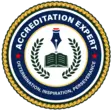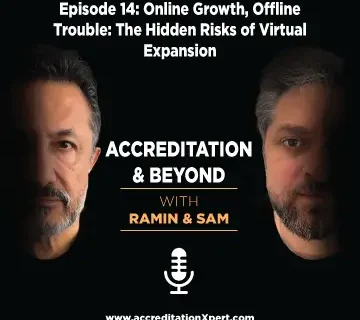
School Accreditation Denial
Last year, over 40% of schools applying for accreditation were denied. For many of these institutions, it wasn’t the quality of education or student outcomes that caused the rejection. It was the paperwork, the structure, and the systems behind the scenes. In this episode, we uncover the hidden challenges that block schools from earning accreditation and how these issues can be addressed long before the evaluators arrive.
This episode provides a comprehensive look at why many educational institutions in the U.S. fail to achieve accreditation. The host, Dr. Ramin Golbaghi, breaks down the key internal issues that often go unnoticed until it’s too late. It’s not just about teaching and learning; it’s about being organized, transparent, and compliant at every level of school operations.
Key Issues Discussed:
1- Financial Documentation Gaps
Many schools don’t have clean, auditable financial records. Missing budgets, unclear expense reporting, or failure to follow basic accounting standards can raise red flags. Accreditation bodies require financial transparency to ensure sustainability and responsibility.
2- Record-Keeping Failures
Whether it’s incomplete student transcripts, missing staff qualifications, or disorganized academic records, poor documentation can be a dealbreaker. The episode emphasizes how digital tools and proactive planning can prevent these issues.
3- Weak Organizational Structure
Schools often operate without clearly defined leadership roles or policies. Accreditation evaluators want to see structure, governance, and accountability. This includes board oversight, HR practices, and operational consistency.
4- Misaligned Intentions
Some schools pursue accreditation without truly committing to the long-term quality standards it represents. This misalignment shows during site visits and interviews. Schools must internalize the purpose of accreditation as part of their growth.
5- Last-Minute Fixes Don’t Work
Quick solutions, last-minute documentation, or superficial policy changes usually hurt more than help. Accreditation success requires long-term planning, honest evaluation, and readiness across all departments.
6- The Role of Consultants
Consultants aren’t miracle workers. They can guide, audit, and recommend improvements, but the heavy lifting must be done by the school itself. The episode stresses the need for internal ownership and culture change.
Accreditation isn’t just a badge , it’s a reflection of operational excellence and long-term commitment to quality. If your school is preparing for accreditation, this episode offers a real-world roadmap to avoid common pitfalls and build a foundation for success.
Common Mistakes That Lead to Denial:
| No clear budgeting process | Raises financial red flags |
| Missing or unverified staff qualifications | Fails compliance checks |
| Undefined leadership roles | Signals poor governance |
| Outdated or missing student records | Undermines credibility |
| Rushed preparation | Leads to incomplete documentation |
Who Should Listen:
- School administrators
- Accreditation consultants
- Quality assurance officers
- Policy makers in education
- Faith-based and charter school leaders
Need expert help with accreditation? Contact us today for a free consultation and let’s prepare your institution the right way.





